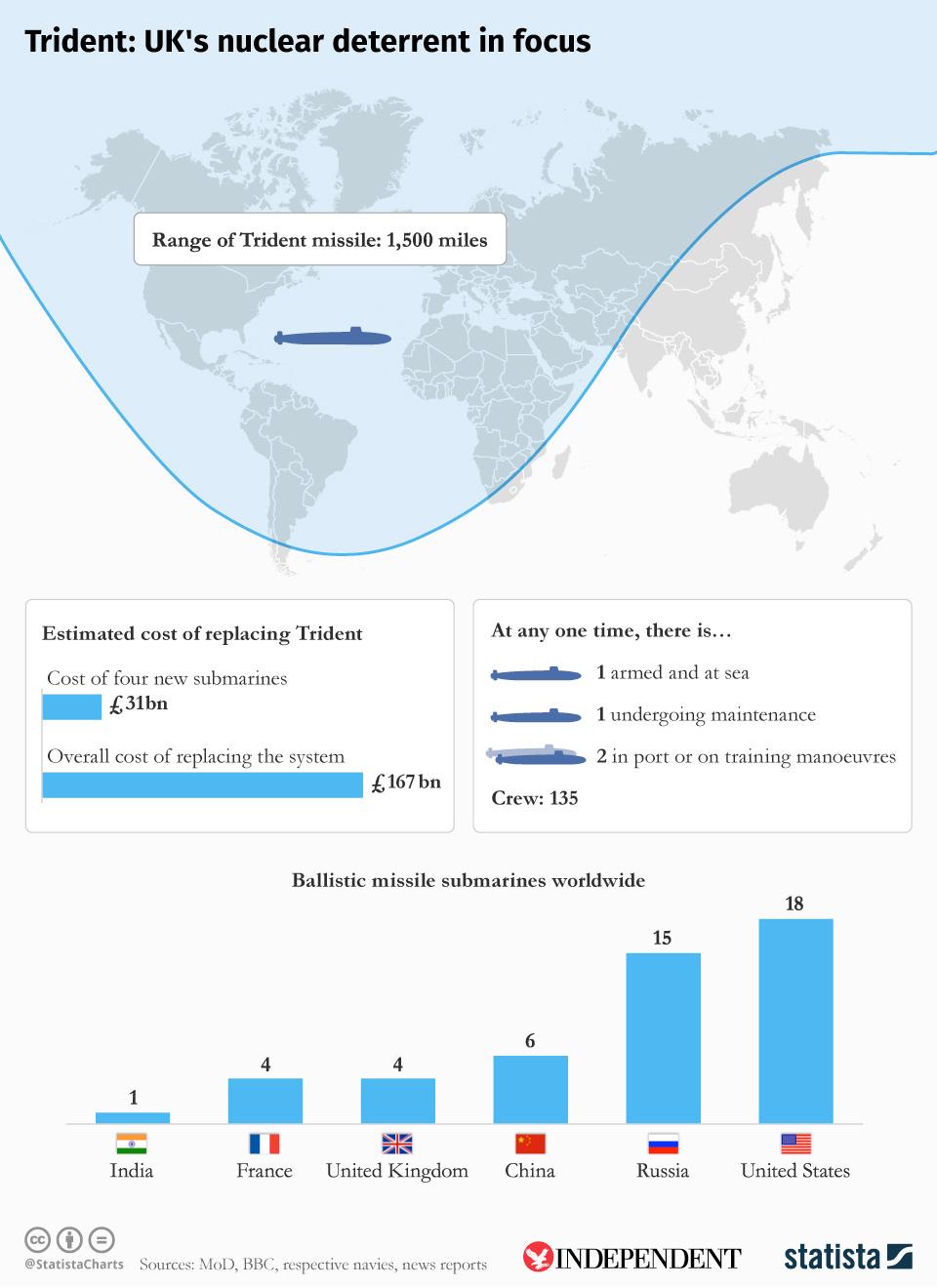Trident: What is Britain's nuclear deterrent? Why does it need replacing? How much will it cost?
Parliament is due to vote on whether to renew the UK's nuclear submarines
MPs are set to vote on whether to renew Britain’s nuclear weapons programme after a House of Commons debate.
In her first statement to the House since becoming Prime Minister, Theresa May said it would be a “gross irresponsibility” for the UK not to renew Trident.
She said: "We cannot abandon our ultimate safeguard out of misplaced idealism. That would be a reckless gamble."
What is Trident?
The Trident programme covers the UK's development, procurement and operations of its current generation of nuclear weapons.
The programme has four Vanguard-class submarines in operation which are currently based in Scotland.
The system, which was commissioned in 1980 and went into service in 1994, replaced Polaris which was in operation between 1968 and 1996.
Unlike previous systems, the Trident programme is not “targeted” because it went into service after the fall of the Soviet Union.
Previous Cold War systems were targeted with the aim of protecting Britain and its Nato allies from Warsaw Pact members.
Why do we need a new one?
The submarines were designed to last between 30 and 40 years - after which time they would need to be replaced, repaired or decommissioned.
The Ministry of Defence has said that it could extend the life of the submarines by five to 30 years but this would be risky and expensive as it would involve repairing or upgrading the parts onboard.
Certain parts, such as the generators which make steam from nuclear energy to power the turbines, would require expensive refits and it will only increase its lifespan for a short time.

In addition, refurbishments increase the likelihood of there being times when no submarine is out on patrol.
Under the current system, one submarine is always armed and out at sea at all times.
How much will it cost to replace?
Figures released by the MoD have suggested the maintenance of the system over its lifetime would not rise beyond six per cent of the annual defence budget - with the cost of four new submarines being put at £25bn.
But growth forecasts for the UK released by the International Monetary Fund (IMF) show that means the total bill for Trident’s replacement could be £167bn.
The new figures estimate that the programme would run between 2028 and 2060.
But the Campaign for Nuclear Disarmament (CND) claim the true figure could be around £205bn once the cost of decommissioning has been taken into account.
The Royal United Services Institute estimated in 2013 that a new system would cost between £70bn and 80bn over its lifetime but the independent Trident Commission put that figure at £100bn.

Is it worth it?
Opinion is divided on whether Trident should be renewed. Ms May claims the nuclear threat has increased and it would be “reckless” to abandon Britain’s nuclear programme.
It has been argued it would be foolish for Britain carry out nuclear disarmament on its own rather than waiting for an agreement with multiple foreign powers.
Nato has warned against any member countries disarming, saying it is a “core component” of its overall defence and deterrence capabilities.
In addition to security concerns, commentators say Britain needs nuclear weapons to maintain its position as a world power in light of it being overtaken economically by countries like China.

US defence secretary Ash Carter said the UK needed the deterrent to maintain its “outsized” place on the world stage.
According to a graph made by Statista, the UK has far fewer submarines than its closest allies - or its biggest rivals.
But opponents of nuclear weapons, including Labour leader Jeremy Corbyn, say it is immoral keep weapons capable of that much destruction regardless of whether you ever use them.
They point to the devastation of Hiroshima and Nagasaki and the fact that nuclear weapons have been deployed accidentally 13 times as a reason that having nuclear weapons can never be safe.
Others, such as Conservative MP Crispin Blunt, argue that the supposed security benefits do not justify the cost.
Join our commenting forum
Join thought-provoking conversations, follow other Independent readers and see their replies
Comments
Bookmark popover
Removed from bookmarks